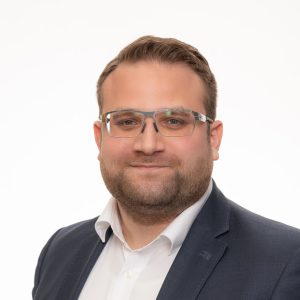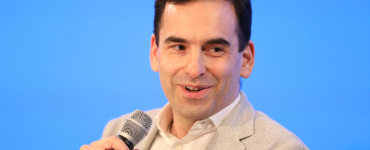Welcome to the Advisory Board of the eco Mobility Competence Group (CG), Mr. Ioannis Lalissidis! The eco Association is very pleased to welcome another expert as an advocate for the digital mobility industry. Since March 2025, the team leader in Cooperation Management at Deutsche Automobil Treuhand GmbH (DAT), who brings extensive experience in the automotive industry, has been part of the five-member Advisory Board. In this interview, he introduces himself and outlines his goals.
Mr. Lalissidis, which aspects of digital transformation in the mobility sector do you find particularly promising, and why?
From my perspective, there are three areas in particular that show great potential for the further development of the mobility sector: 1. The use of telematics data will enable even faster diagnostics and maintenance in the future. 2. Autonomous driving will completely transform our perception of vehicles and how we use them in everyday life. 3: I would also mention the aspect of “transparent customers”: the industry must already confront the question of which data can provide helpful insights for transforming customer service in the long term.
As a member of the Advisory Board, how would you like to enrich the work of the Mobility Competence Group?
It is important to me to advocate for solutions and standards that are accepted across the industry. This includes identifying general problems, addressing them openly and then working together to develop and promote solutions. I’m looking forward to exchanging ideas with other experts!
What role do you see for innovative technologies such as AI and Big Data in the future development of the mobility sector?
AI and Big Data not only provide a better understanding of driver behaviour as well as analyses and trends. I’m convinced that AI will take our driver assistance systems to the next level. With powerful algorithms and continuous real-time learning, AI-supported driver assistance systems will make more precise decisions in areas like lane-keeping, predictive braking and pedestrian detection – and then adapt driving behaviour accordingly. In this way, the technology can not only increase driving comfort, but also anticipate critical situations earlier, react proactively and significantly reduce accident risks.
What do you see as the greatest challenges for sustainable mobility, and how can the eco Competence Group support this?
A major challenge is creating uniform structures among manufacturers and authorities so that processes can be transformed and run smoothly. In order to make progress here, I believe it is essential to incorporate position papers and guidelines from associations such as eco.
What experiences or projects from your professional career can add value to the activities of the Competence Group?
My 15 years of experience in the automotive industry – particularly in car dealership processes and service provider management – enable me to contribute solid and fresh insights. Through my work at Deutsche Automobil Treuhand (DAT), which acts as a neutral intermediary between dealers and manufacturers, I’ve developed a comprehensive understanding of the challenges and opportunities in this field. I have also deepened this knowledge by pursuing a part-time degree in automotive economics at the Institute for Automotive Economics (IFA).
In your opinion, what priorities should be set in the area of regulation and law for the mobility sector?
I can answer that very simply: innovation before regulation. By that I mean that we should focus clearly on ensuring that regulations do not slow down or even prevent the development and spread of useful, innovative technologies. Rather, they should create a framework for innovation to grow.
How do you think we can improve cooperation between industry, research and the public sector?
Different stakeholders need to engage in targeted dialogue through networking formats such as conferences, trade fairs and workshops. Then it is important to bring the urgent issues to the table, discuss them and find solutions together – even if that means forming a joint venture.
What motivates you personally to get involved in the eco Mobility Competence Group?
Over the past two years, I have been involved in the Car Repair 4.0 project funded by the German Federal Ministry for Economic Affairs and Climate Action, which eco supported as a consortium partner, and my experience has been thoroughly positive. The project researched differentiated fault diagnosis in vehicles based on machine learning. Now that it has come to an end, I am particularly pleased to continue the activities in the Mobility Competence Group and to initiate new discussions. I would like to further strengthen my commitment and play a leading role in putting the most important industry topics on the Competence Group’s agenda.
Become part of Mobility CG!
Are you interested in regularly exchanging ideas with the experts in the eco Mobility Competence Group and working together on industry-relevant challenges?




